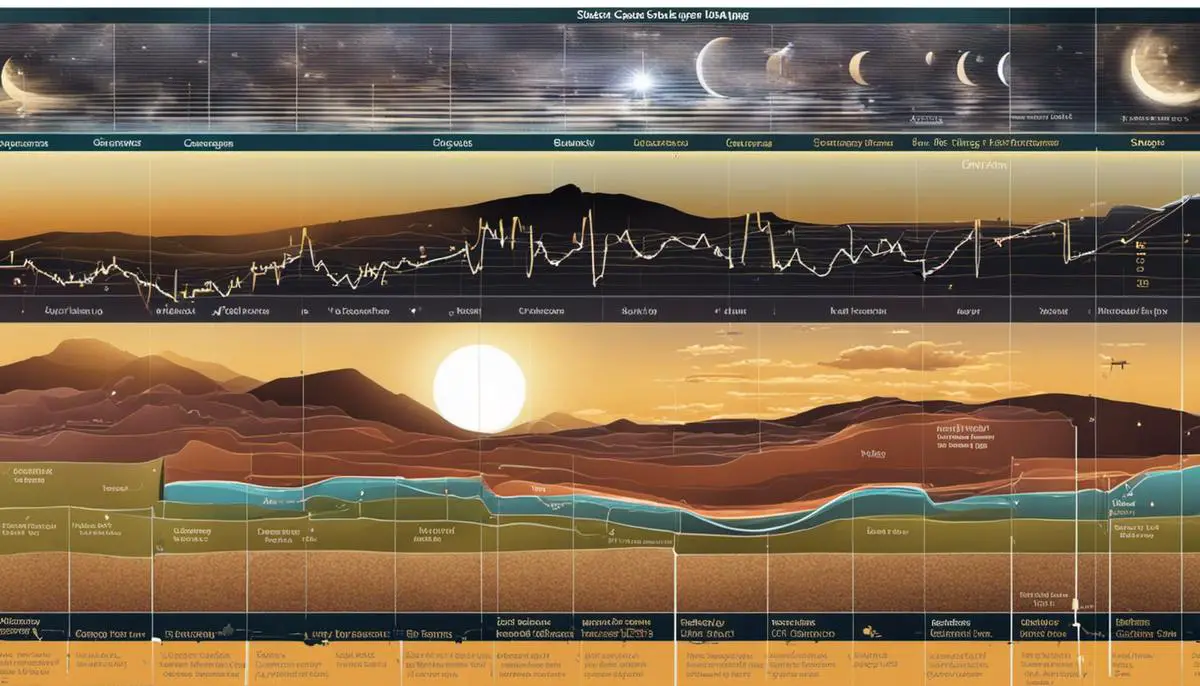The intersection of alcohol consumption and sleep quality is a focal interest to researchers, clinicians and the general public alike, given its enormous implications for public health. The understanding of sleep cycles, ascends from the basic biology right up to its relevance to wellness as a whole. Offering a comprehensive view, it’s essential to explore how alcohol affects the physical body, its metabolism and the time it resides in one’s system, paving way to a clearer grasp of its impact. On further magnification, the direct implications of alcohol on sleep, starting from the onset, duration to impact on various sleep stages, creates a riveting landscape rooted in substantial research evidence. The intersection doesn’t stop at mere sleep disruptions but extends to alcohol-associated health risks and long-term impact of alcohol-induced sleep pattern disturbances. As sobering as this understanding may be, acknowledging that there are practical measures that can be taken to minimize the impact of alcohol on sleep, indeed provides a beacon of hope.
Basic Understanding of Sleep Cycles
Understanding Sleep Cycles
A key component to the human biological process is sleep, and understanding its structure and phases is an essential part of understanding the overall effects of alcohol on sleep. The sleep cycle comprises five unique stages: 1, 2, 3, 4, and rapid eye movement (REM) sleep. Altogether, these stages make up the 90-minute cycle.
Stage 1 is the lightest stage of sleep, the transitional phase, where the sleeper easily wakes up. In stage 2, the body begins to prepare for deep sleep by decreasing body temperature and slowing heart rate. Stages 3 and 4, often lumped together as ‘deep sleep’ stages, are when the body rejuvenates and repairs, with growth hormones released for tissue repair and replenishment of energy.
The final stage, REM sleep, is when most dreaming occurs, and the brain’s activity level is similar to wakefulness, contributing to memory consolidation and learning. Each night, the typical adult experiences five to six complete sleep cycles.
Significance of Sleep Cycles to Overall Health
Sleep is not merely a ‘time-out’ from our busy routines. Each stage of sleep plays a distinct role in maintaining our physical and mental health. Deep sleep stages (3 and 4), for instance, help with physical recovery and aspects like immune functioning, while REM sleep is vital for memory consolidation, learning, and mood regulation.
If sleep cycles are interrupted or deprived, it can lead to cognitive issues like difficulty concentrating and memory problems. Long-term sleep disturbances can lead to serious health problems, including obesity, diabetes, cardiovascular disease, and even early mortality.
Unraveling the Gearwork: Alcohol and Sleep Cycles Interruption
Often categorized as a depressant, alcohol is regularly consumed as a sleep facilitator. It indeed initiates quicker sleep onset and increases deep sleep in the first part of the night. However, it also burglarizes the rejuvenating Rapid Eye Movement (REM) sleep usually occurring in the second half of the sleep.
Furthermore, when the alcohol begins to metabolize, individuals might experience a ‘rebound effect.’ This leads to sleep interruptions, often accompanied by nightmares, hindering the individual from achieving the essential continuous sleep that is fundamental for feeling refreshed and alert the following day.
Moreover, alcohol may exacerbate breathing problems during sleep, spinning the sleep cycle into further turmoil. Conditions like sleep apnea and snoring are frequently worsened by alcohol due to its muscle-relaxing effects, including those around the throat.
From a simpler standpoint, alcohol ingestion before sleep often heightens the need for nighttime urination, causing another form of sleep disruption.
Prolonged heavy drinking can drastically manipulate the sleep-wake cycle, forming a dependence on alcohol for initiating sleep, and potentially giving rise to a cycle of addiction. This alteration makes maintaining a consistent sleep and wake pattern markedly challenging, disturbing their circadian rhythm, and negatively impacting their mental and physical health.
In conclusion, despite seeming to assist with sleep initiation, the consumption of alcohol intrudes on sleep quality, results in prolonged sleep disorders, and poses a risk to overall health.

Alcohol and Its Effects on the Body
Understanding the Impact: Main Effects of Alcohol on the Human Body and Brain
Surely, alcohol has far-reaching effects on the human body, touching every corner from the brain to major organs. When consumed, alcohol is rapidly absorbed into the bloodstream via the stomach and small intestines, with the liver metabolizing approximately one standard drink every hour.
In our brain, alcohol behaves as a depressant. It hampers the functioning of the central nervous system that governs the majority of bodily functions, leading to compromised coordination, intellectual processing, and decision-making abilities. Alcohol also unsettles the brain chemistry by interfering with neurotransmitters -chemical messengers that are crucial in managing the brain’s overall wellbeing and functionality. Such disruption can drive alterations in mood, behavior, and cognitive functions.
Significantly, excessive alcohol consumption can lay the foundation for severe health complications. Direct repercussions include chronic liver diseases, cardiovascular diseases, and type 2 diabetes, among others. When alcohol is metabolized, the liver produces detrimental by-products culminating in inflammation and scar tissue, thereby speeding up liver damage. Moreover, alcohol can also precipitate pancreatitis, a severe inflammation and swelling of blood vessels in the pancreas, sabotaging proper digestion.
Alcohol and The Sleep-Wake Cycle
One of the main issues with alcohol consumption, particularly in excess, is the way it interferes with the normal sleep-wake cycle. While alcohol initially might have a sedative effect, which helps an individual fall asleep faster, it later disrupts the second, deeper stage of sleep, known as the Rapid Eye Movement (REM) sleep.
During REM sleep, dreams occur, and memory and learning are consolidated. As such, disruptions in REM sleep can lessen sleep quality and affect cognitive functions, including attention, concentration, and motor skills.
Alcohol also affects the production of a hormone called adenosine, which promotes sleep. After drinking, production of adenosine is increased, causing an initial feeling of tiredness. However, as adenosine levels decrease later in the night, it can trigger awakening and difficulty going back to sleep.
Understanding the Duration of Alcohol in the System
The length of time alcohol lingers in an individual’s system greatly hinges on a variety of factors, including weight, age, gender, the type of alcohol consumed, and the state of liver health. Generally, the liver is capable of metabolizing roughly one standard drink each hour. Nonetheless, this doesn’t imply that the alcohol is fully flushed out of the system within this time frame – traces can still be detected in the blood, urine, and breath for several days or potentially weeks following the last drink.
In conclusion, while one might initially turn to alcohol as an aid to fall asleep, it gradually disrupts sleep patterns over time and results in a decline in sleep quality. Beyond this, the negative impacts of alcohol on various bodily organs and the brain can lead to a series of health complications. Therefore, adopting a mindful approach to drinking is crucial in preserving overall health and wellness.

The Direct Impact of Alcohol on Sleep Cycles
The Effect of Alcohol on Natural Sleep Onset
Indulging in alcohol before bedtime can indeed stimulate an immediate sleep-inducing effect, helping individuals to fall asleep faster. Nonetheless, this is merely a fleeting advantage. As the night unfolds, the alcohol’s initial sedative impact diminishes and can, in fact, trigger insomnia-like symptoms, interrupting the body’s natural sleep commencement. Alcohol brings about an upsurge of adenosine – a sleep-promoting chemical – in the brain, triggering a swift onset of sleep. Yet, this surge quickly fades, often causing an individual to wake up prematurely and thus, still not fully rested.
The Role of Alcohol in Sleep Duration
While alcohol can temporarily promote drowsiness and speed up the process of falling asleep, it often shortens the actual duration of sleep. After the initial deep sleep period, the effect of alcohol diminishes, leading to lighter and more fragmented sleep as the night goes on. This can greatly reduce the total amount of sleep a person gets, leaving them groggy and tired even after a full night’s rest.
Alcohol and The Various Sleep Stages
Alcohol affects the cyclical nature of sleep, particularly taking a toll on REM (Rapid Eye Movement) sleep. REM is a critical phase of rest where dreaming occurs, and issues such as learning, memory, and mood are regulated. When alcohol is consumed before sleep, REM sleep is typically postponed and shortened. This can cause cognitive issues, memory problems, and affect emotional health.
Evidence from Randomized Controlled Trials and Research
Several studies have corroborated the negative impact of alcohol on sleep cycles. A study published in the Journal of Neurology, Neurosurgery & Psychiatry found that alcohol consumption before sleep led to an increase in alpha wave patterns in the brain, a kind of cerebral activity that occurs when awake but resting. This could disrupt restorative sleep.
Another research review in the journal Alcoholism: Clinical and Experimental Research highlights that alcohol consumption can exacerbate symptoms of sleep apnea and other breathing-related sleeping disorders. The research suggests that alcohol decreases the muscle tone of the upper airway, making it more likely to collapse.
Perceptions and Reality of Alcohol’s Role in Sleep
Many individuals, as revealed by various surveys, believe alcohol functions as a helpful sleep aid. Indeed, according to the Sleep Foundation’s Sleep in America poll, approximately 20% of Americans turn to alcohol to aid in managing their sleep. This belief, however, may be leading to an unintentional disruption of their sleep cycles. Consequently, these disruptions not only diminish sleep quality but also pose potential health risks. As revealed by these surveys and subsequent research, alcohol consumption might initially appear to improve sleep, but ultimately it significantly disrupts sleep cycles and reduces overall sleep quality.

Alcohol, Sleep Disruptions and Associated Health Risks
The Destructive Influence of Alcohol on Sleep
Contrary to common perception, the use of alcohol as a sleep agent comes with significant repercussions, including the substantial disruption of the sleep-wake cycle. Although alcohol might initially act as a sedative and induce sleep, the seemingly beneficial effect does not endure. As the night proceeds, the sedating influence of alcohol diminishes, leading to a fragmented and restless sleep characterized by frequent awakenings.
Equally important is the impact of alcohol on different stages of sleep. Consuming alcohol close to bedtime can specifically disrupt the Rapid Eye Movement (REM) sleep phase, which is an essential period of restorative sleep. This disruption can then contribute to diminished concentration, impaired motor skills and affected memory the day after.
Alcohol-Induced Sleep Interruptions and Associated Health Risks
The health implications associated with alcohol-induced sleep disruptions are immense and multifaceted. A lack of restorative sleep owing to alcohol consumption can result in increased fatigue and decreased concentration, negatively affecting productivity and cognitive abilities.
Sleep interruptions can also lead to various physical health risks. These include an increased risk of cardiovascular diseases, obesity, and type II diabetes. Chronic sleep deprivation resulting from continuous alcohol consumption is linked to neurocognitive disorders and a weakened immune system, making individuals more susceptible to various illnesses.
The Long-term Impact Of Alcohol-Disrupted Sleep Schedules
Persistently disrupted sleep schedules due to alcohol pose significant long-term health threats. Regular consumption of alcohol before bedtime can result in sleep disorders such as insomnia, sleep apnea, and restless legs syndrome, which can be detrimental to overall health.
Long-term sleep disruptions can also lead to mental health disorders. It increases the risk of depression, anxiety, and other psychiatric disorders. Importantly, individuals may fall into a vicious cycle of consuming more alcohol to cope with these disorders, further exacerbating the sleep disruptions and associated health impacts.
Health Complications Arising From Alcohol-Induced Sleep Disruptions
Chronic alcohol consumption before sleep can cause health complications beyond the direct physiological impacts. The disruption also extends to the circadian rhythm, which regulates daily physiological processes. This disruption can alter the body’s internal clock and metabolic processes, leading to digestive issues, fluctuating blood pressure, disrupted hormone production, and even certain cancers.
Moreover, alcohol disrupts sleep hygiene, a set of recommended behavioral and environmental practices intended to promote better quality sleep. By disrupting these patterns, alcohol can lead to severe sleep disturbances and associated health problems.
To summarize, nightly consumption of alcohol, particularly prior to retiring for the night, has been linked to significant health issues caused by an interruption in our normal sleep rhythms. A balanced approach to alcohol consumption alongside healthy sleep habits may lead to an improvement in sleep health and overall well-being.

Steps to Minimize Alcohol’s Impact on Sleep
Delving Deeper into the Effects of Alcohol on Sleep
The impact of alcohol on the quality and amount of restful sleep a person gets cannot be overstated. While alcohol may seem like a quick solution for those who struggle to fall asleep, it can disrupt sleep cycles, leading to a more fragmented and less rejuvenating slumber. Most often, the disruptive effects of alcohol become apparent during the latter half of the night, as the alcohol is broken down by the body. This interference in our natural sleep rhythm can result in waking up throughout the night, experiencing nightmares, night sweats, and other sleep disturbances.
Regulating Alcohol Serving Sizes
One strategy to minimize alcohol’s impact on sleep is to regulate your serving sizes of alcoholic drinks. It is recommended to consume moderate amounts, if one decides to drink. In terms of serving size, it’s generally recommended that men limit their alcohol consumption to two standard drinks per day and women to one standard drink. This can help maintain a balanced sleep schedule without experiencing the negative impact of alcohol overconsumption.
Setting a Cut-off Drinking Time
Another effective approach to minimizing the disruptive effects of alcohol on your sleep cycle is by setting a cut-off time for drinking. Alcohol should ideally be discontinued about 2-3 hours before bedtime. This allows your body ample time to metabolize the alcohol before you sleep, reducing the chances for disrupted sleep cycles.
Maintain Proper Hydration
Maintaining proper hydration is also crucial when consuming alcohol. Alcohol can cause dehydration, which in turn may result in a dry mouth, thirst, and fronting sleep disruptions. Therefore, alternating between alcoholic and nonalcoholic drinks, particularly water, during consumption can help ensure proper hydration levels.
Adopting Sleep-promoting Habits
Finally, adopting certain pre-sleep habits can help improve the quality of your sleep, even if you consume alcohol. These habits might include establishing a regular sleep routine, creating a quiet and dark sleeping environment, and avoiding caffeine and heavy meals close to bedtime. Furthermore, relaxation techniques such as mindful meditation, progressive muscle relaxation, or deep breathing exercises can also be beneficial in counteracting the sleep-disruptive effects of alcohol.
Consider Alcohol-free Days
It is also recommended to have several alcohol-free days a week. This can not only help improve your overall sleep, but it can also minimize your tolerance to alcohol, meaning you can feel the effects of alcohol with fewer drinks, which in the long term can help reduce alcohol consumption levels and its corresponding impact on sleep.
In summary, while alcohol can indeed disrupt sleep cycles, there are several steps you can take to minimize these effects, including controlling serving sizes of alcoholic drinks, setting a drinking cut-off time, staying hydrated, adopting sleep-promoting pre-sleep habits, and considering alcohol-free days.

At the end of our exploration, it is evident that the relationship between alcohol and human sleep cycles is complex and necessitates a deeper understanding for its broader implications. The interconnectedness between alcohol consumption, sleep disruption and the subsequent health risks it might trigger, further underscores the importance of gaining comprehensive awareness. Despite its detriments, it’s heartening to know that with sensible precautions and modifications in lifestyle choices, the impact of alcohol on sleep cycles can be minimized. Knowledge, after all, is a powerful tool to make informed choices and withstand adversities, and this couldn’t be more significant than in the context of maintaining our foundational health layers- sleep quality, alcohol consumption boundaries and the resultant overall well-being.
